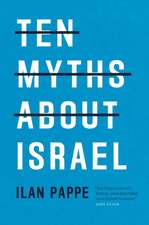Syria, the United States, and the War on Terror in the Middle East: Praeger Security International
Autor Robert G. Rabilen Limba Engleză Hardback – 27 feb 2006 – vârsta până la 17 ani
Din seria Praeger Security International
- 18%
 Preț: 334.19 lei
Preț: 334.19 lei - 8%
 Preț: 335.53 lei
Preț: 335.53 lei - 34%
 Preț: 376.10 lei
Preț: 376.10 lei - 46%
 Preț: 443.64 lei
Preț: 443.64 lei - 29%
 Preț: 240.11 lei
Preț: 240.11 lei - 8%
 Preț: 304.56 lei
Preț: 304.56 lei - 34%
 Preț: 373.82 lei
Preț: 373.82 lei - 19%
 Preț: 412.79 lei
Preț: 412.79 lei - 19%
 Preț: 338.42 lei
Preț: 338.42 lei - 18%
 Preț: 335.62 lei
Preț: 335.62 lei - 27%
 Preț: 377.35 lei
Preț: 377.35 lei - 27%
 Preț: 376.75 lei
Preț: 376.75 lei - 18%
 Preț: 336.46 lei
Preț: 336.46 lei - 18%
 Preț: 321.73 lei
Preț: 321.73 lei - 27%
 Preț: 384.51 lei
Preț: 384.51 lei - 18%
 Preț: 320.50 lei
Preț: 320.50 lei - 18%
 Preț: 320.50 lei
Preț: 320.50 lei - 18%
 Preț: 321.35 lei
Preț: 321.35 lei - 24%
 Preț: 420.54 lei
Preț: 420.54 lei - 14%
 Preț: 335.99 lei
Preț: 335.99 lei - 18%
 Preț: 355.82 lei
Preț: 355.82 lei - 18%
 Preț: 319.83 lei
Preț: 319.83 lei - 18%
 Preț: 334.28 lei
Preț: 334.28 lei - 32%
 Preț: 354.48 lei
Preț: 354.48 lei - 14%
 Preț: 335.14 lei
Preț: 335.14 lei - 38%
 Preț: 405.98 lei
Preț: 405.98 lei - 40%
 Preț: 571.34 lei
Preț: 571.34 lei - 18%
 Preț: 321.85 lei
Preț: 321.85 lei - 18%
 Preț: 323.25 lei
Preț: 323.25 lei - 18%
 Preț: 253.28 lei
Preț: 253.28 lei - 40%
 Preț: 571.50 lei
Preț: 571.50 lei - 14%
 Preț: 333.72 lei
Preț: 333.72 lei - 18%
 Preț: 301.73 lei
Preț: 301.73 lei - 19%
 Preț: 352.96 lei
Preț: 352.96 lei - 26%
 Preț: 387.80 lei
Preț: 387.80 lei - 18%
 Preț: 302.77 lei
Preț: 302.77 lei - 14%
 Preț: 333.91 lei
Preț: 333.91 lei - 17%
 Preț: 325.80 lei
Preț: 325.80 lei - 24%
 Preț: 338.58 lei
Preț: 338.58 lei - 34%
 Preț: 414.73 lei
Preț: 414.73 lei - 18%
 Preț: 354.30 lei
Preț: 354.30 lei - 29%
 Preț: 254.29 lei
Preț: 254.29 lei - 18%
 Preț: 354.11 lei
Preț: 354.11 lei - 18%
 Preț: 334.38 lei
Preț: 334.38 lei - 14%
 Preț: 302.68 lei
Preț: 302.68 lei - 18%
 Preț: 322.97 lei
Preț: 322.97 lei - 27%
 Preț: 376.50 lei
Preț: 376.50 lei - 27%
 Preț: 322.81 lei
Preț: 322.81 lei - 27%
 Preț: 382.91 lei
Preț: 382.91 lei - 18%
 Preț: 320.87 lei
Preț: 320.87 lei
Preț: 338.09 lei
Preț vechi: 410.48 lei
-18% Nou
Puncte Express: 507
Preț estimativ în valută:
64.70€ • 69.18$ • 53.94£
64.70€ • 69.18$ • 53.94£
Carte tipărită la comandă
Livrare economică 18 aprilie-02 mai
Preluare comenzi: 021 569.72.76
Specificații
ISBN-13: 9780275990152
ISBN-10: 027599015X
Pagini: 320
Dimensiuni: 156 x 235 x 31 mm
Greutate: 0.64 kg
Editura: Bloomsbury Publishing
Colecția Praeger
Seria Praeger Security International
Locul publicării:New York, United States
ISBN-10: 027599015X
Pagini: 320
Dimensiuni: 156 x 235 x 31 mm
Greutate: 0.64 kg
Editura: Bloomsbury Publishing
Colecția Praeger
Seria Praeger Security International
Locul publicării:New York, United States
Notă biografică
Robert G. Rabil is Assistant Professor and Director of Graduate Studies in the Political Science Department at Florida Atlantic University, Boca Raton. The author of Embattled Neighbors: Syria, Israel, and Lebanon (2003), he writes frequently for the Washington Institute for Near East Policy, a think tank founded in 1985 to promote understanding of America's interests in the Middle East.
Cuprins
IntroductionCradle of Arab Nationalism: The Fatherland, the Ba'th and Modern Syria under AsadThe Beginning of U.S.-Syrian Relations: Between the Arab-Israeli Conflict and the Cold WarThe Emergence of U.S.-Syrian Ambivalent RelationshipThe Fulcrum of Elusive PeaceThe Unholy RelationshipA New Cold War?The New Struggle for Lebanon: Democracy and Syria's WithdrawalSyria Post-Withdrawal: Reform or Dictatorship?ConclusionSelected Bibliography
Recenzii
Although Rabil completed this book in March 2005, he was prescient in analyzing the politics of Syria, Lebanon, and Hezbollah. Rabil suggested conditions could lead to war, which did occur in July-August 2006. He cites reasons for the US government's growing frustration with Syria's support for resistance forces in Iraq, Hamas, and Islamic jihad. Rabil contends the Asad regime's policy of liberalizing the economy is accompanied by even more authoritarian measures to contain dissent. One such policy is to encourage Pan-Arabism as well as Islamist ideologies. The assassination of former Lebanese Prime Minister Refik Hariri in 2005, which resulted in a popular revolt compelling the withdrawal of Syrian forces from Lebanon, encouraged the author to think that Lebanon might yet be able to foster a viable Lebanese state. But the war between Hezbollah and Israel jeopardized this possibility. Indeed, the war may well result in another prediction of the author's coming true: Syria is set to clash with the United States over the future of the Middle East..Highly recommended. Upper-division undergraduates through practitioners.
Rabil has written a dispassionate and scrupulously researched account of the Middle Eastern dynamics that stand at the centre of today's most urgent challenges. Unlike other books that have been written about Syria and US foreign policy, this work stands out in its in-depth treatment of ideological and socio-political realities in the region.
[M]uch more than an overview of United States-Syrian relations. It sketches the most important developments in the Levant and its surroundings from the mid-20th century to today. Thus it also deals with Israel, Lebanon, Turkey, Iraq, and Iran, while keeping a clear and systematic focus on how their complex interconnections link to Syria's foreign policy..Against the background of the Israel-Hizbollah war of July 2006, Rabil's book is ideally placed to aid understanding of the latest dynamics..[a] dispassionate and scrupulously researched account of middle-eastern political dynamics. Those who have made or might consider a trip to Syria and the region could benefit from reading it.
Robert Rabil's latest book is much more than an overview of US-Syrian relations. It sketches the most important developments in the Levant and its surroundings from the middle of the 20th century up to today. Thus the book also deals with Israel, Lebanon, Turkey, Iraq, and Iran. Nevertheless, Rabil keeps a clear, systematic focus on the complex linkages between regional developments and Syria's foreign policy..Rabil has written a dispassionate and scrupulously researched account of the Middle Eastern dynamics that lie at the center of today's most urgent challenges. Unlike other books that have been written about Syria and US foreign policy, this work stands out in its in-depth treatment of ideological and socio-political conditions in the region. To his credit, Rabil does not view the Levant simply through the lens of US policy; consequently, the title of the book is narrower than the author's actual perspective.
Rabil has written a dispassionate and scrupulously researched account of the Middle Eastern dynamics that stand at the centre of today's most urgent challenges. Unlike other books that have been written about Syria and US foreign policy, this work stands out in its in-depth treatment of ideological and socio-political realities in the region.
[M]uch more than an overview of United States-Syrian relations. It sketches the most important developments in the Levant and its surroundings from the mid-20th century to today. Thus it also deals with Israel, Lebanon, Turkey, Iraq, and Iran, while keeping a clear and systematic focus on how their complex interconnections link to Syria's foreign policy..Against the background of the Israel-Hizbollah war of July 2006, Rabil's book is ideally placed to aid understanding of the latest dynamics..[a] dispassionate and scrupulously researched account of middle-eastern political dynamics. Those who have made or might consider a trip to Syria and the region could benefit from reading it.
Robert Rabil's latest book is much more than an overview of US-Syrian relations. It sketches the most important developments in the Levant and its surroundings from the middle of the 20th century up to today. Thus the book also deals with Israel, Lebanon, Turkey, Iraq, and Iran. Nevertheless, Rabil keeps a clear, systematic focus on the complex linkages between regional developments and Syria's foreign policy..Rabil has written a dispassionate and scrupulously researched account of the Middle Eastern dynamics that lie at the center of today's most urgent challenges. Unlike other books that have been written about Syria and US foreign policy, this work stands out in its in-depth treatment of ideological and socio-political conditions in the region. To his credit, Rabil does not view the Levant simply through the lens of US policy; consequently, the title of the book is narrower than the author's actual perspective.












